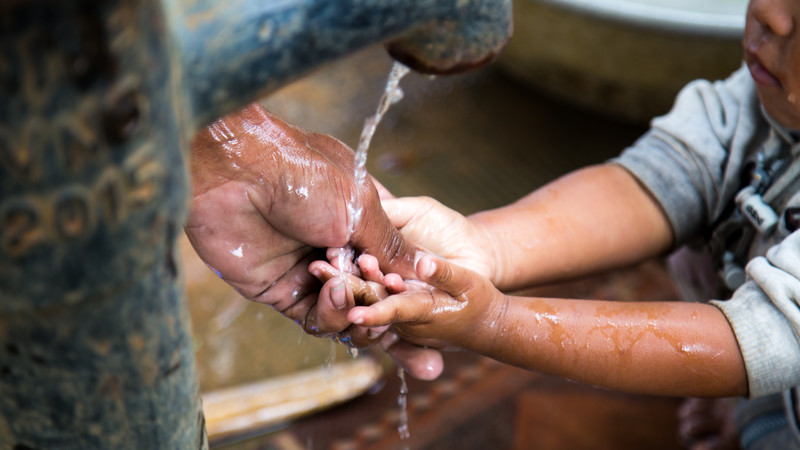What I’m learning during Lent from the coronavirus outbreak

Francis Stewart is a member of CAFOD’s Theology team. He reflects on celebrating Lent in the time of coronavirus, and what he’s learning about life’s priorities, how we worship, and the limits to our control.
Sorting out my priorities
As a relatively healthy, young person, I am not feeling personally threatened by the virus yet. It is older people, those with underlying health conditions, and those who are more exposed and vulnerable (such as homeless people) who are most threatened.
Noticing this, I feel my priorities being reoriented. The most fragile among us move to the top of my list of concerns, where they should be in good times and bad times.
Worshipping in the wilderness
Communion of only one kind, no sign of peace, and, in the parish where I go, no hymn books – many Catholics will be familiar with these measures already – and now there is to be no public worship at all. This is the experience of worship in times of isolation, in the wilderness, perhaps.
Through the absence of the sensory features we are so used to and perhaps have even taken for granted, I’m learning again what ordinarily makes Mass a celebration of communion.
Use our Lent calendar to keep your prayer going outside of Church services
Keeping the doors open
The Church’s calendar of events might be cancelled, but the doors of churches will remain open. Perhaps in craving the gathering, the performing and the celebrating offered by churches, I am forgetting the dwelling-places that they offer for people seeking comfort and often safety.
Is worship exclusively a “doing”? Perhaps it can simply be a being, an abiding, a dwelling and a waiting in God’s presence, which no virus can thwart. CAFOD’s support for humanitarian programmes in Syria, where people daily confront a life-threatening crisis, reveals the crucial role of local religious organisations to abide with people, to be dwelling places and sanctuaries for the wounded.
The limits to control
I’m confronted with the illusion we had of complete control. Something unpredictable in our midst demands vigilance but also marks a limit to our certainty about what to do. Hopefully, we fall back on common sense and diligence to hygiene, and, most of all, a gentleness towards others, restraint and attentiveness. We also have to learn how to respect distance and meet people authentically, though perhaps virtually, especially if we have been asked to stay at home.
The temptation to double-down on control is sharpened. Panic prompts stock-piling and uncharitable attitudes when there is actually all the more reason to share our reserves with the poor. In spite of constant reassurance that there is enough to go round, we are afraid, and we hold on tight to what we have. In these times how can we reflect on Jesus’ words? “Look at the birds of the air; they do not sow or reap or store away in barns, and yet your heavenly Father feeds them. Are you not much more valuable than they?” (Matthew 6: 26)
I was recently watching goldfinches flit from house to house from the kitchen window. Their busy, joyous disrespect for whose window is whose seems to display a trust that the heavenly Father will feed them. We can’t flit like the birds in these times, but nor can we simply clamp down and hold tight to our control over what we have. There are many in our communities that are in need. Jesus’ first temptation in the wilderness was, in a way, to demand “fast food” from his Father, bread from a stone. That temptation to want everything now might be our temptation too, especially when we enter the supermarket. But we don’t live on bread alone.
The food banks are struggling. Those who have little are left with even less. But during Lent in particular, self-denial must surely at some point yield charity, as faith must yield works. So I am reminded by a fellow parishioner of the words from the letter of James: “If a brother or sister is naked and lacks daily food, and one of you says to them, Go in peace, keep warm and eat your fill, and yet you do not supply their bodily needs, what is the good of that?” (James 2: 15-16).
Coronavirus prayers: prayer for the end of the virus
The global commons
Finally, I’m confronted with the crisis of the global commons: the shared space where goods, services and people criss-cross. The vast potential of connection was unleashed, but without the adequate global regulating authority to make this fair and sustainable.
Already for years we have seen how a “winner takes all” system facilitates the exploitation of the poor and the earth. Are we left to rely on local organisations to hold off panic and hold-fast to charity, and to hope that churches can continue to keep open their doors?
Or is this also a prime-time to globalise our own caring, salvaging some good from this pandemic, whilst we wait patiently for the time when we can exchange the peace, share space and drink from the same cup?
This article was originally published by The Tablet on Thursday 19 March 2020.